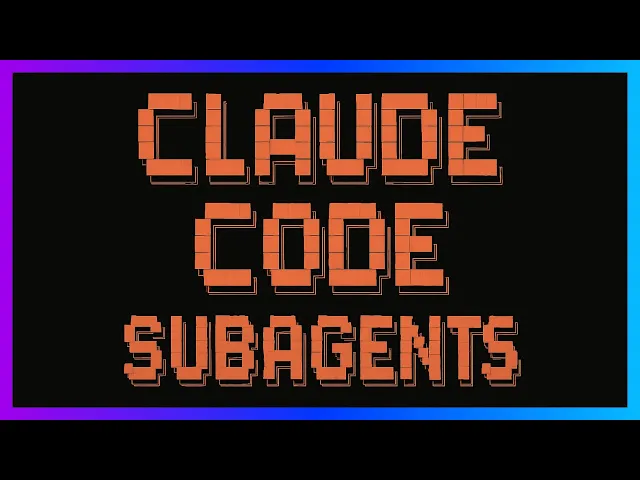Claude Code Sub Agents in 7 Minutes

Claude's sub-agents unlock code mastery
The future of AI coding assistants is evolving rapidly, with Anthropic's Claude leading a significant breakthrough in how large language models (LLMs) approach complex programming tasks. In a recent developer demo, Anthropic unveiled Claude's new "sub-agent" architecture that fundamentally transforms how AI handles multi-step code generation and debugging challenges. This approach represents a crucial step toward creating AI systems that can think more systematically about programming problems.
Key Points
- Claude's sub-agent architecture breaks down complex coding tasks into specialized functions that act as mini-experts for specific programming challenges
- This approach mirrors human programming patterns where different brain modules handle distinct aspects of coding (planning, implementation, debugging)
- Sub-agents significantly outperform traditional LLMs by maintaining consistent focus and avoiding the "lost in thought" syndrome that plagues complex reasoning
The Revolution in AI Reasoning
The most striking insight from Claude's sub-agent approach is how it fundamentally reimagines AI problem-solving architecture. Rather than treating code generation as a single monolithic task, Anthropic has built a system that decomposes programming challenges into logical subtasks, each handled by specialized reasoning modules.
This matters immensely because it addresses one of the most persistent limitations in AI coding assistants: the tendency to lose focus during extended reasoning chains. Traditional LLMs attempt to hold the entire problem context in their "working memory," leading to errors as complexity increases. The sub-agent approach instead mirrors how human programmers actually work—switching between different cognitive modes for planning, implementation, and validation.
In the broader industry context, this represents an important step toward AI systems that can handle increasingly complex software engineering tasks. As businesses integrate AI coding assistants into their development workflows, the ability to maintain consistent reasoning across multi-stage problems becomes essential for building reliable, production-ready code.
Beyond the Demo: Real-World Applications
While the video focuses primarily on the technical architecture, the implications for enterprise software development are substantial. Consider healthcare software development, where patient data processing requires both complex algorithms and bulletproof error handling. Traditional AI assistants might generate the core algorithm but miss critical edge cases or validation steps. Claude's sub-agent approach, with dedicated modules for verification and error handling, could dramatically reduce the security and reliability risks that have limited AI adoption in regulated industries.
Recent Videos
How To Earn MONEY With Images (No Bullsh*t)
Smart earnings from your image collection In today's digital economy, passive income streams have become increasingly accessible to creators with various skill sets. A recent YouTube video cuts through the hype to explore legitimate ways photographers, designers, and even casual smartphone users can monetize their image collections. The strategies outlined don't rely on unrealistic promises or complicated schemes—instead, they focus on established marketplaces with proven revenue potential for image creators. Key Points Stock photography platforms like Shutterstock, Adobe Stock, and Getty Images remain viable income sources when you understand their specific requirements and optimize your submissions accordingly. Specialized marketplaces focusing...
Oct 3, 2025New SHAPE SHIFTING AI Robot Is Freaking People Out
Liquid robots will change everything In the quiet labs of Carnegie Mellon University, scientists have created something that feels plucked from science fiction—a magnetic slime robot that can transform between liquid and solid states, slipping through tight spaces before reassembling on the other side. This technology, showcased in a recent YouTube video, represents a significant leap beyond traditional robotics into a realm where machines mimic not just animal movements, but their fundamental physical properties. While the internet might be buzzing with dystopian concerns about "shape-shifting terminators," the reality offers far more promising applications that could revolutionize medicine, rescue operations, and...
Oct 3, 2025How To Do Homeless AI Tiktok Trend (Tiktok Homeless AI Tutorial)
AI homeless trend raises ethical concerns In an era where social media trends evolve faster than we can comprehend them, TikTok's "homeless AI" trend has sparked both creative engagement and serious ethical questions. The trend, which involves using AI to transform ordinary photos into images depicting homelessness, has rapidly gained traction across the platform, with creators eagerly jumping on board to showcase their digital transformations. While the technical process is relatively straightforward, the implications of digitally "becoming homeless" for entertainment deserve careful consideration. The video tutorial provides a step-by-step guide on creating these AI-generated images, explaining how users can transform...
